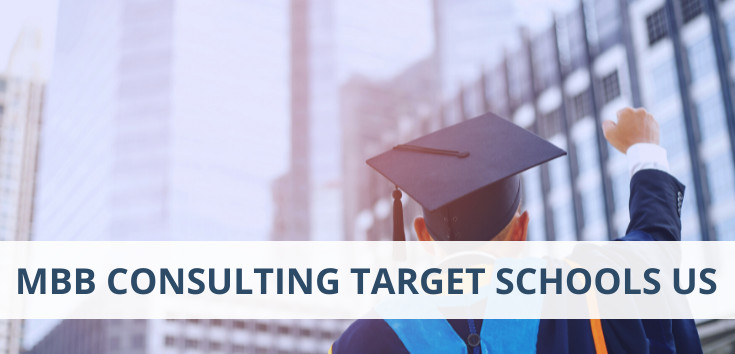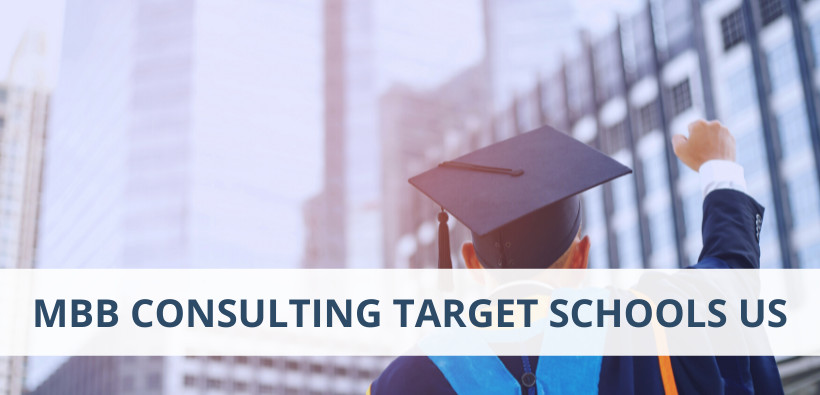To get a job at Mckinsey, Bain or BCG you will have to have attended one of the MBB target schools and have graduated from there. That's what's stuck in the heads of many prospective consultants. But is that really the case? And if so, which schools are these in the US? And do I have a chance even if I didn't go to one of the schools listed? Francesco, case coach and expert in the field of consulting, answers these and other questions in this article.


MBB Target Schools in the US
Strategy consulting is one of the most attractive career choices for recent graduates (and even experienced hires), and it is little wonder why: working at a top consulting firm offers prestige, great career opportunities, and annual remuneration easily above $100,000 (for entry-level roles) — a combination that few professions are able to match. All these factors combined result in the MBB firms (consisting of McKinsey, BCG, and Bain) receiving hundreds of thousands of applications annually. As expected, there is no way the firms can give each of these applications the attention they deserve.
Accordingly, the firms have to prioritize (after all, it is a key consulting skill), and a key criterion for this prioritization is the school of the candidate. Each firm has its own preferred recruiting grounds; they will give extra attention to applications from these schools, and even go out of their way to court the students via networking and recruitment events.
So, what makes these schools so special that their students get an edge in the ultra-competitive consulting recruitment process? Well, these schools offer top-notch education, elite career support services, and usually have multiple student-run consulting-related student bodies so their students can support each other throughout the recruitment process (e.g., sharing networking contacts, exchanging case preparation materials, and conducting mock interviews with each other). All these factors result in the students of the school being better prepared for the rigorous recruitment process employed by top firms. Accordingly, the schools place multiple graduates into the MBB firms every year and thus warrant extra attention from them.
So, what are these target schools? Well, the MBB firms do not exactly go out of their way to advertise which schools they prefer. After all, that would be counterproductive: very strong candidates from non-target schools might be demotivated and deterred from applying, depriving the firm of many potential consultants; such a practice may also be deemed discriminatory, and open the firms up to legal risks. Accordingly, the list of targets schools can only be pieced together indirectly from multiple sources such as school placement statistics and firm networking events.
Thankfully, there is an easier way to identify these schools at the MBA-level for the US offices. The US offices of the MBB firms organize special pre-MBA programs every year where they introduce upcoming MBA students to the firm, its people, its culture, and consulting in general. These programs (specifically McKinsey Early Access, BCG Unlock, and ExperienceBain) are not open to all schools; hence, we can assume that the qualifying schools are also the MBB target schools:


Source: 1. McKinsey & Company, 2. Boston Consulting Group, 3. Bain & Company
According to the data, McKinsey has the fewest target schools at 17, BCG is next with 27 schools, while Bain accepts 30 schools for its program, the most out of the three.
Note that we can assume the schools highlighted above are target schools in the US. However, this does not imply that if a school is not on the list, it is not a target school. Moreover, non-US schools like INSEAD and London Business School are considered target schools for all MBB offices worldwide. Therefore, we can consider the list above as a data-based subset of the target schools in the US.
It is also important to note that the schools above are MBA-level targets. While many of the colleges and universities are also target schools for non-MBAs, there are some differences: some of them do not place well outside their MBA programs, whereas other non-listed institutions (such as top liberal art colleges Williams and Amherst) might have a strong placement history for their non-MBA programs.
So, what happens if you are not from one of these schools? Is this the end of your MBB dreams? No! Every year, hundreds of candidates join the MBB firms from non-target schools. In fact, this number is only increasing as competition for talent intensifies, forcing the MBB firms to widen their recruitment pool (check out our article on consulting industry trends in to learn more). The main advantage coming from a target school provides is that you would have a strong brand on your resume and your application will be given more attention. Once you make it past the application screening stage, the brand of your school becomes a lot less relevant.
With this in mind, there are two main ways one can overcome the target school advantage:
Improve Your Resume
Sure, you might not have an elite school on your resume, but that does not mean your resume is immediately inferior to those with an elite school on them. The MBB firms are meritocratic organizations looking for the best talent possible. Therefore, as long as you take every available opportunity to improve your profile (e.g., achieve a great GPA, participate in case competitions, take up leadership roles) and refine each line in your resume to make sure it is concise, fact-based, and results-oriented, there is no reason you cannot beat out your target school competitors. Check out our consulting resume guide to learn how you can best frame your experiences and grab the attention of your resume screener.
Network
The harsh reality is that coming from a non-target school, you will have fewer opportunities to network with MBB consultants. The MBB firms will not be coming to your campus to wine-and-dine you in the hopes that you will apply to join them; neither will you have a wide selection of school alumni at the MBB firms ready to help you.
That being said, networking is far more important for you than for your target school counterparts; therefore, you will need to put in more effort to make it work. While some options (e.g., exclusive networking and recruitment events) are limited for you, there are still many avenues that you can pursue in terms of networking, such as leveraging your personal network, attending public firm events, and cold contacting consultants online. Check out our article on networking to learn how you can network your way into the MBB firms using these methods.
Overall, being from a target school certainly helps you get your foot into the MBB recruitment process, but the advantages end there. Some might even argue that the target school advantage is slowly being eroded as the MBB firms are expanding their recruitment pools. Once you get past the resume screening stage, everyone is on even ground, and your ability to progress further is mainly dependent on your preparedness for the tests as well as the case interview and personal fit interviews. The path to a coveted offer will be a hard one regardless of where you graduate from. So, if you are from a target school, do not rest on your laurels; if you are not from a target school, work on improving your profile and network, and you may very well end up with interviews as well.
About the Author
#1 Expert for Coaching Sessions (3.600+) | 1.300+ Reviews with 100% Recommendation Rate | Ex BCG | 8+ Years of Coaching
- Professional Experience: BCG
- Languages: English, Italian, Spanish
- Location: Singapore
Francesco is an interview coach, former BCG consultant, and tech entrepreneur. He is the #1 coach on PrepLounge.com for meetings done, where he completed more than 3.000 expert sessions. As a coach for consulting interviews, Francesco helped hundreds of candidates to land offers from McKinsey, BCG, and Bain. Since 2016, he organizes consulting boot camps in some of the leading universities in Europe. As a consultant, Francesco joined BCG in the Milan office, where he worked on projects in the energy, industrial goods, and consumer goods sectors. After BCG, he worked in venture capital in Germany as an angel fund associate. As an entrepreneur, Francesco founded two companies in Europe and Asia in the entertainment and EdTech sectors. He is currently leading a Singapore-based company and supporting startups as a strategic advisor.
Continue to Learn






